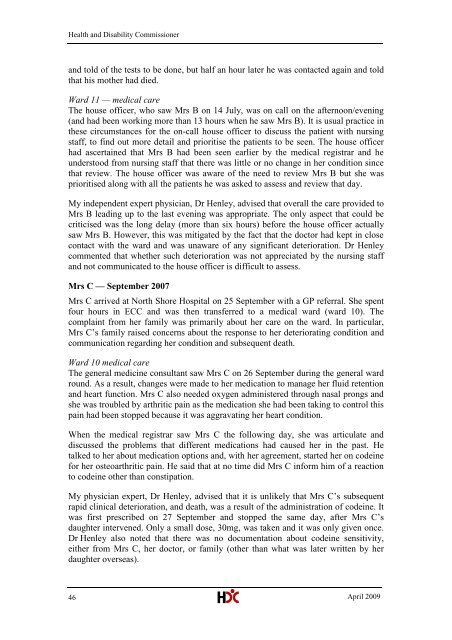North Shore Hospital report - New Zealand Doctor
North Shore Hospital report - New Zealand Doctor
North Shore Hospital report - New Zealand Doctor
Create successful ePaper yourself
Turn your PDF publications into a flip-book with our unique Google optimized e-Paper software.
Health and Disability Commissionerand told of the tests to be done, but half an hour later he was contacted again and toldthat his mother had died.Ward 11 — medical careThe house officer, who saw Mrs B on 14 July, was on call on the afternoon/evening(and had been working more than 13 hours when he saw Mrs B). It is usual practice inthese circumstances for the on-call house officer to discuss the patient with nursingstaff, to find out more detail and prioritise the patients to be seen. The house officerhad ascertained that Mrs B had been seen earlier by the medical registrar and heunderstood from nursing staff that there was little or no change in her condition sincethat review. The house officer was aware of the need to review Mrs B but she wasprioritised along with all the patients he was asked to assess and review that day.My independent expert physician, Dr Henley, advised that overall the care provided toMrs B leading up to the last evening was appropriate. The only aspect that could becriticised was the long delay (more than six hours) before the house officer actuallysaw Mrs B. However, this was mitigated by the fact that the doctor had kept in closecontact with the ward and was unaware of any significant deterioration. Dr Henleycommented that whether such deterioration was not appreciated by the nursing staffand not communicated to the house officer is difficult to assess.Mrs C — September 2007Mrs C arrived at <strong>North</strong> <strong>Shore</strong> <strong>Hospital</strong> on 25 September with a GP referral. She spentfour hours in ECC and was then transferred to a medical ward (ward 10). Thecomplaint from her family was primarily about her care on the ward. In particular,Mrs C‘s family raised concerns about the response to her deteriorating condition andcommunication regarding her condition and subsequent death.Ward 10 medical careThe general medicine consultant saw Mrs C on 26 September during the general wardround. As a result, changes were made to her medication to manage her fluid retentionand heart function. Mrs C also needed oxygen administered through nasal prongs andshe was troubled by arthritic pain as the medication she had been taking to control thispain had been stopped because it was aggravating her heart condition.When the medical registrar saw Mrs C the following day, she was articulate anddiscussed the problems that different medications had caused her in the past. Hetalked to her about medication options and, with her agreement, started her on codeinefor her osteoarthritic pain. He said that at no time did Mrs C inform him of a reactionto codeine other than constipation.My physician expert, Dr Henley, advised that it is unlikely that Mrs C‘s subsequentrapid clinical deterioration, and death, was a result of the administration of codeine. Itwas first prescribed on 27 September and stopped the same day, after Mrs C‘sdaughter intervened. Only a small dose, 30mg, was taken and it was only given once.Dr Henley also noted that there was no documentation about codeine sensitivity,either from Mrs C, her doctor, or family (other than what was later written by herdaughter overseas).46April 2009
















